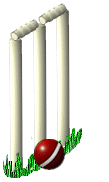Hanse Cronje
Created | Updated Apr 10, 2003

The sudden and tragic death of Hanse Cronje at the weekend was a tragedy as he was only starting to be allowed to partake in the sport he loved again. He will, sadly, be forever remembered as the highest level cricketer to have his name - and career - tarnished by allegations of match-fixing. However, he was an exceptional talent who rose at the tender age of 24 to captain his country and continued to do so for 53 of his 68 Test matches.
His Rising Star
Wessel Johannes Cronje was born in Bloemfontein on 25th September 1969 into an Afrikaaner family. He went to school at Grey College, in Bloemfontein, before heading off to the Universtiy of Orange Free State. He was an all-rounder; batting competently and bowling as a medium-pace right-hander. He first appeared for Orange Free State against Transvaal in 1987 whilst still only 18. He went on to captain them when only 21. This same season he made his international debut (1990-91) before deputising for Kepler Wessels as national captain aged 24 in a match against Australia. A year later he took on the national captaincy for the remainder of his international career, joining Leicestershire as their overseas player in 1995.
Cronje had appeared in South Africa's first Test following their re-admission into the International Cricket Board family in 1992, playing against the West Indies. The 1992 series against India was a highlight in his career. In the first one day match he achieved his best bowling figures, in any match, of 5 for 32. And, in December, he achieved his maiden Test Century , his score of 135 was to prove to be his largest contribution with a bat in a test innings. He was a bright young star in the re-emergence of the United Cricket Board of South Africa's national team. He was, however, against the UCB's early tokenism which appointed non-white cricketers not of the right calibre for international cricket. This was merely to adhere to their specified quota and appease the outside world and came to a head in a series in New Zealand.
He lead the national team for 5 years including series wins over England in 19961 and India in 2000, his last appearance for his country. A loss of form during a tour of England led him to offer his resignation but this was turned down by the UCB and he continued in the role until more than his form deserted him.
In total he appeared in 68 Tests making 3,714 runs. He also has the greatest win/loss record of any of his contemporaries as captain.
Fallen Hero
Allegations started to surface that a number of leading players, including Cronje, had been involved in fixing a number of matches at the request of Indian bookmakers. However the head of the UCB, Dr Ali Bacher, fully backed his captain when these allegations first surfaced and barely questioned them. He never swerved from this position of support until, in 1998, Cronje admitted he had been approached to throw a one-off international at Bombay in December 1996. The bookmakers had offered him and the team a quarter of a million US dollars to do so.
The reason for such loyalty was that many previous stories had arisen from the sub-continent2 which proved to be unfounded and much disinformation and inaccuracy still emminated from that direction. However there was other evidence against Cronje not linked directly to Indian rumours. Ball tampering, including standing on a ball during a one-day match in Sydney, Australia, was one example, but instances like this are rare outside the sub-contentient. So, until his own confession, very few people believed that this good, Christian boy from the Orange Free state could be involved with something like this.
He resigned the captaincy and was banned for life in 2000, after winning his last series as captain against India. Just before his death his rehabilitation had started. The courts cleared him to be involved in coaching or reporting cricket, though the ban remained in place on his playing.
The End
On the morning of 1 June 2002 he left Johannesburg in a small plane with two other passengers onboard. It came down, in the Outeniqua mountains, outside the city of George, Western Cape Province, about 500 kilometres east of Cape Town, where it had been unable to land due to poor weather.
His Stats
| Matches | Runs | Wickets | High Score | Best Bowling | |
| Tests | 68 | 3714 | 43 | 135 | 3 for 14 |
| ODI3 | 188 | 5565 | 114 | 112 | 5 for 32 |
| First Class Matches | 184 | 12103 | 116 | 251 | 4 for 47 |
| Class A One Days | 303 | 9855 | 170 | 158 | 5 for 32 |
